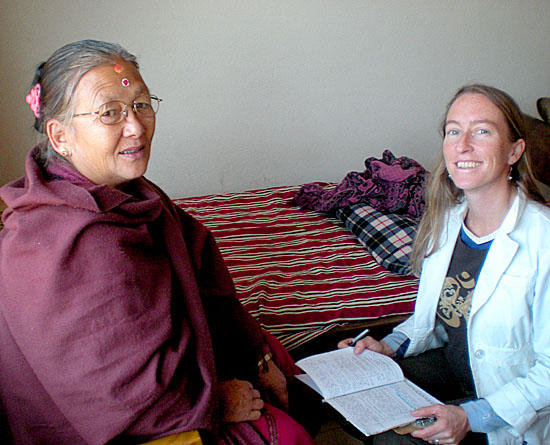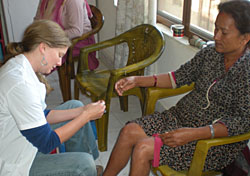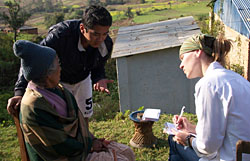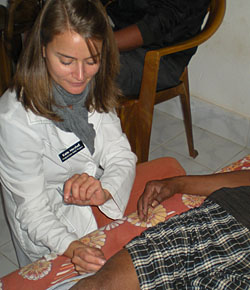
{s5_mp3}http://www.acupuncturereliefproject.org/images/stories/mp3/OMV2.mp3{/s5_mp3}One Minute View: Episode 2
These first few weeks have gone fast! It's amazing how quickly all the newness of such an experience is transformed into a mostly reliable routine. That routine serves as a safety net for all the unknowns in a day. A common theme that has come up for us is the idea of "what gets lost in translation anyway?". This idea is multi-dimensional and in it is reflected a person's story, a person's belief system, how a person understands something, and how well our language conveys across culture the story we are telling. Our interpreters are trained very well for their jobs - they are excellent! They make the exchange almost seamless! They not only interpret what we say and what our patients say, but they also have to interpret the context and the emotion of what is said.
 It's
similar to a game of telephone but rather than the story being changed
through a long line of people, it is more a matter of how our stories
get filtered through our different ways of experiencing the world.
Despite our mostly clear communication, we realize that some concepts
don't exist in one culture exactly the same as it does in another. I
recently learned that there really is not a word in Nepali for
"throbbing", as in a throbbing headache, but rather the interpreter
explains that the patient says, "the headache feels like it does when
you have your finger on someone's pulse." It's a beautiful moment when
it comes together like that!
It's
similar to a game of telephone but rather than the story being changed
through a long line of people, it is more a matter of how our stories
get filtered through our different ways of experiencing the world.
Despite our mostly clear communication, we realize that some concepts
don't exist in one culture exactly the same as it does in another. I
recently learned that there really is not a word in Nepali for
"throbbing", as in a throbbing headache, but rather the interpreter
explains that the patient says, "the headache feels like it does when
you have your finger on someone's pulse." It's a beautiful moment when
it comes together like that!
 I sit back at the end of a day of
treating patients and observing the other practitioners treating, and
settle on this idea: what gets lost in translation is made up for by
watching someone's facial expression, by observing a persons hands when
they talk, by watching their chest rise and fall to understand their
breathing, by noticing how someone gets in or out of their chair, by
paying attention to the tone of their voice behind the story, by
palpating the spots that hurt, and by looking in their eyes clearly for
the moment when the ritualistic "namaste" is exchanged in their coming
and going. Sometimes the story matches what we expect to hear - "I have
diabetes, I have knee pain, or I have burning and tingling in my feet"
I sit back at the end of a day of
treating patients and observing the other practitioners treating, and
settle on this idea: what gets lost in translation is made up for by
watching someone's facial expression, by observing a persons hands when
they talk, by watching their chest rise and fall to understand their
breathing, by noticing how someone gets in or out of their chair, by
paying attention to the tone of their voice behind the story, by
palpating the spots that hurt, and by looking in their eyes clearly for
the moment when the ritualistic "namaste" is exchanged in their coming
and going. Sometimes the story matches what we expect to hear - "I have
diabetes, I have knee pain, or I have burning and tingling in my feet" and other times
the story makes us see something differently as a person shares that
they believe they might have a curse on them, or they had an organ
removed and then put back in the right place, or sometimes a nerve grows
out of the corner of their toe and when it does it hurts and they cut
it off. As a practitioner, sometimes I rely on the story I'm hearing
while other times I may follow a feeling or intuition of the experience
that seems to resonate in their story. In the case of the mystery toe
pain... Maybe they're telling me they have an ingrown toenail that feels
incredibly nervy and painful or maybe they are experiencing something
that is completely lost in translation. As I work though the many puzzles
and mysteries I come to this essential realization. The realization
that if we learn to listen carefully and do our best to hear not only
the story they share but also the story they embody, the treatment we
offer can speak better to the overall CARE of that individual patient.
The more we improve in this skill, the more we minimize all that gets
lost along the way. The story that each of us shares, through the bridge
of an interpreter or through the descriptive sounds and the hand
gestures, are the stories that link us together. It is the sharing of
our stories that creates deeper understanding and compassion between us
and opens our eyes to much more than what simple words can convey. – Diane Wintzer
and other times
the story makes us see something differently as a person shares that
they believe they might have a curse on them, or they had an organ
removed and then put back in the right place, or sometimes a nerve grows
out of the corner of their toe and when it does it hurts and they cut
it off. As a practitioner, sometimes I rely on the story I'm hearing
while other times I may follow a feeling or intuition of the experience
that seems to resonate in their story. In the case of the mystery toe
pain... Maybe they're telling me they have an ingrown toenail that feels
incredibly nervy and painful or maybe they are experiencing something
that is completely lost in translation. As I work though the many puzzles
and mysteries I come to this essential realization. The realization
that if we learn to listen carefully and do our best to hear not only
the story they share but also the story they embody, the treatment we
offer can speak better to the overall CARE of that individual patient.
The more we improve in this skill, the more we minimize all that gets
lost along the way. The story that each of us shares, through the bridge
of an interpreter or through the descriptive sounds and the hand
gestures, are the stories that link us together. It is the sharing of
our stories that creates deeper understanding and compassion between us
and opens our eyes to much more than what simple words can convey. – Diane Wintzer
Admin note: This was Diane Wintzer's second trip to Nepal with the Acupuncture Relief Project. This fall she served as our project lead and course instructor. When she is not in Nepal, Diane practices at Fearn Natural Health Clinic in Camas Washington. Thanks Diane for your continued service.











